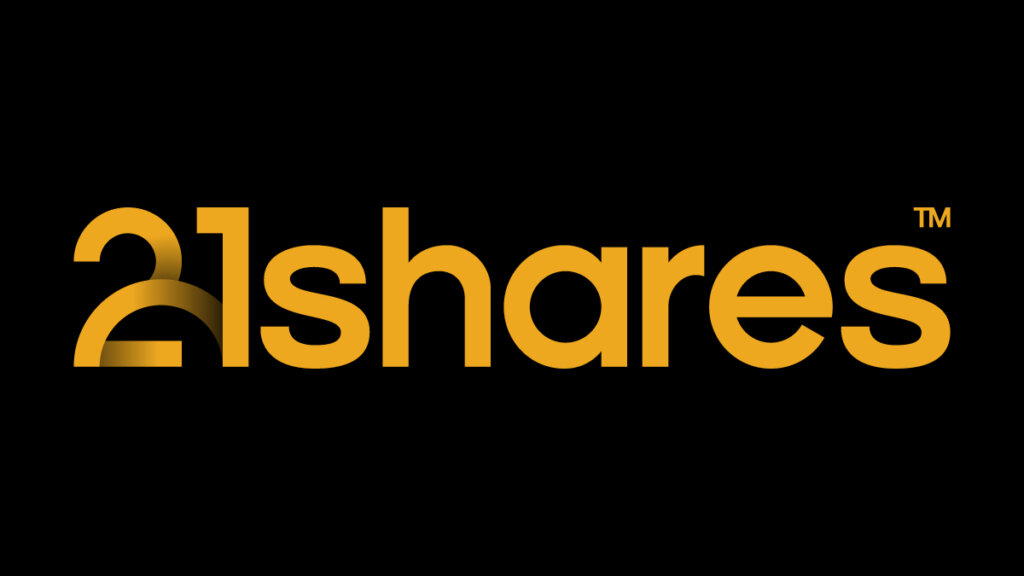Crypto’s Infrastructure Gets a Facelift as TradFi’s Interest in Tokenization Grows
Markets continued to tumble amid uncertain regulatory and macroeconomic conditions. While a new Bitcoin Spot ETF application entered the race, Bitcoin was the only positive outlier of last week’s rally, jumping slightly by 0.32%, while Ethereum fell by around 2.33%. Optimism suffered the least within the scalability solutions, dipping by only 0.74% over the past week. On the other hand, Maker suffered the least in returns among its decentralized finance peers, dipping by -1.01% over the past week.
Figure 1: Weekly Price and TVL Developments of Cryptoassets in Major Sectors
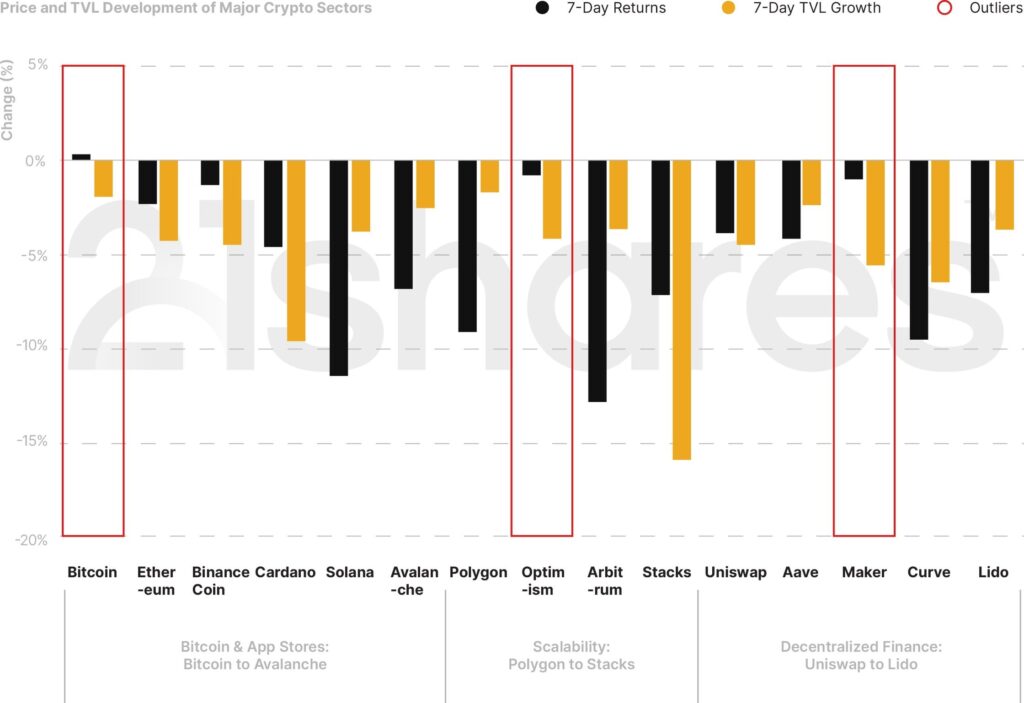
Source: 21Shares, CoinGecko, DeFi Llama. Close data as of September 12, 2023.
5 Things to Remember in Markets this Week
• Controversy Around Staking in Switzerland
The crypto industry in Switzerland warned against the reported plans of the Financial Markets Supervisory Authority (FINMA) to restrict staking services to those with banking licenses. FINMA based its rationale on temporarily locking assets by staking protocols and the risk that assets could be seized from participants in cases of improper validation or other rule violations, known as Slashing, when a validator exhibits harmful behavior. That said, FINMA categorized staking as public deposits rather than custody assets since they’re not immediately available, and therefore, staking providers based in Switzerland would require banking licenses. The key concern from the Swiss Blockchain Federation was that FINMA’s flawed interpretation of staking could take a toll on the competitive environment, arguing that comparing the cores of staking protocols and banks would be unfair. Especially with the unanimous passing of the DLT Act, the federation also pointed out that such a change of practice would undermine the legal clarity achieved by the legislation exactly three years ago.
• Uniswap’s Dismissed Case Shows Court Understands DeFi Better
District Judge Katherine Polk Failla dismissed a lawsuit filed originally by a group of investors in April 2022 who accused Uniswap Labs and its founder Hayden Adams of allegedly operating an unregistered exchange or broker-dealer, offering and soliciting securities on an unregistered exchange. The plaintiffs allegedly lost money to scam tokens, namely EthereumMax (EMAX), Bezoge (BEZOGE), and Alphawolf Finance (AWF) traded on Uniswap. While dismissing the lawsuit in full, Judge Failla called Ethereum a commodity and told the plaintiffs that the defendants in this case should be the issuers of the aforementioned tokens and that Congress was more authorized to address their other concerns.
The main takeaway is that regulators are getting more acquainted with the nitty gritty of decentralized finance; more crypto education and regulators keen on understanding novel innovations should pave the way for mass adoption in the long run. This showed especially when the plaintiffs argued that Uniswap was like a self-driving vehicle manufacturer (a metaphor for the scam tokens). The judge responded in the Memorandum and Opinion, saying that the car manufacturer is not analogous with Uniswap’s relationship with the listed tokens, but instead, the case is more like a lawsuit against an application like Venmo or Zelle for a drug deal that used the platform to facilitate the illicit activity.
• Traditional Finance Players Capitalize on Asset Tokenization
The London Stock Exchange (LSE), the eighth largest in the world, has been studying blockchain as a technology for a year now, and they have reportedly just decided to use it to power a new trading venue. While they won’t facilitate crypto asset trades on this venue, the news is still a win for the industry. This would make it the first large global stock exchange to use blockchain technology to power an end-to-end trading venue for its investors, handling issuance, trading, reconciliation, and settlement, all on-chain.
So far, there is about $800M in bonds tokenized on blockchains, according to the European Securities and Markets Authority (ESMA). Polygon, Ethereum, and Avalanche have partnered with giants such as JP Morgan, UBS, and KKR. On August 31, SWIFT published results from its experimentation with Ethereum’s blockchain. Leveraging Chainlink’s cross-chain interoperability protocol as an enterprise abstraction layer, SWIFT was able to provide a single point of access to multiple networks using existing, secure infrastructure, and in turn, significantly reducing operational challenges and investment required for institutions to support the development of tokenized assets.
Figure 2: Tokenized Bonds on the Rise
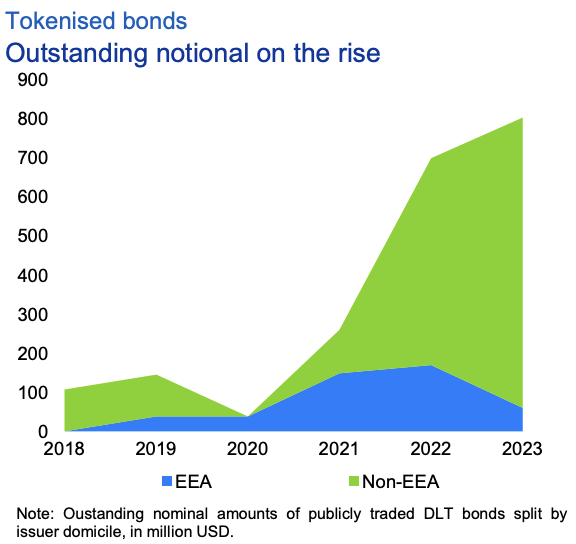
Source: ESMA and Refinitiv
• Polygon Labs introduced a Chain Development Kit (CDK) that utilizes Zero Knowledge Proofs technology to create customized blockchains interoperable with the core Polygon chain and its ecosystem’s networks. This integration offers streamlined access to unified liquidity through a shared ZK-based bridge, although it’s still an untested technology. The CDKs also empower developers to personalize network elements like gas tokens, execution environment, and data availability to suit their requirements. Wirex, a crypto payments platform, has already announced plans to use CDKs to build its own network, attracted by Polygon’s design flexibility and the benefits of consolidated liquidity and native interoperability. Finally, CDKs should strengthen Polygon’s competitive position against Arbitrum’s Orbit and Optimism Op-Stack, especially due to its support for native shared liquidity.
• Offchain Labs, the team behind Arbitrum, unveiled Stylus. The latest network enhancement introduces a new programming environment allowing developers to deploy code in Rust, C, and C++ and expanding the options beyond Ethereum’s traditional EVM-compatible Solidity language. Thus, not only does the broader compatibility open the door to a wider developer base, but it simultaneously reduces transaction costs by an estimated ~10-100x. Further, Stylus is integrated into Nitro, the foundational infrastructure powering the entire Arbitrum stack, including Orbit, the framework for creating custom networks. This means the expanded support for programming languages isn’t limited to just Arbitrum applications; it also simplifies the development of custom networks. Finally, the upgrade could help democratize blockchain development by catering to non-crypto developers who are more accustomed to using the mentioned languages common in Web2 landscapes, thereby expanding the outreach of developing blockchain-based applications. What You Should Pay Attention To
• Cosmos Liquidity to Get a Boost
On September 13, Cosmos is set to activate its next major upgrade, V12 Gala. The upgrade marks a pivotal moment for Cosmos as it transitions away from the current staking architecture in favor of Liquid Staking Derivatives (LSDs). Although LSDs have been available via 3rd parties, the upgrade introduces network innovation, which is expected to significantly enhance the overall security and validation structure. In addition, the innovation addresses the 21-day period by offering a practical solution.
Further, the upgrade allows immediate conversion of 25% of staked ATOM into a liquid asset usable across DeFi. Finally, LSDs will be integrated via a self-regulatory mechanism known as Liquid Staking Module (LSM), which compels validators to put up a bond and align their incentives with the protocol’s interests. While LSDs hold promise over boosting the liquidity of Cosmos, the innovation comes with drawbacks like smart-contract vulnerabilities, depegging risks, and the possibility of validator power concentration. Stride, a leading Cosmos-based staking provider, has introduced an interim solution that distributes delegated ATOM across an active set to deter malicious behavior.
Finally, the upgrade comes at a crucial time for Cosmos as many infrastructure projects are starting to incorporate different forms of interoperability, whether via interchain connectivity like Polygon’s CDKs and Optimism’s OpStack or through cross-chain standardized messaging systems like Layer Zero and Chainlink’s Cross Chain Interoperability Protocol (CCIP), which are jeopardizing Cosmos’s market share. Thus, this upgrade has the potential to enhance user engagement by improving liquidity conditions for both developers and users, allowing Cosmos to remain competitive.
• Can Real-World Integrations Revive Solana?
Visa announced it’ll expand its stablecoin settlement capabilities to the Solana blockchain. In Collaboration with merchant service providers Worldpay and Nuvei, the payments giant will now allow merchants to send and receive USDC. This move is not only expected to improve fund transfers between banks and merchants but also has the potential to greatly reduce cross-border settlements through Solana’s economic network. Visa typically incurs processing costs ranging from 1.15% + $0.05 to 2.40% + $0.10, whereas Solana averages ~$0.000125, highlighting the potential for significant cost reduction.
Visa’s decision comes after Shopify partnered with Solana Pay, enabling USDC settlements on Solana. Such Integrations could revive the network’s on-chain activity, capitalizing on stablecoins’ dominant role within the crypto market, which is relevant in light of Solana’s declining daily active users. It’s also worth noting that Ethereum nearly matched Visa’s settlement volume in Q1 of 23 by processing $3.01T Vs $3.04T, emphasizing stablecoins’ significant impact on blockchain activity and their potential in helping Solana’s recovery while showcasing the role crypto’s railways in enhancing global payments.
Figure 3: Number of Active Addresses on Solana
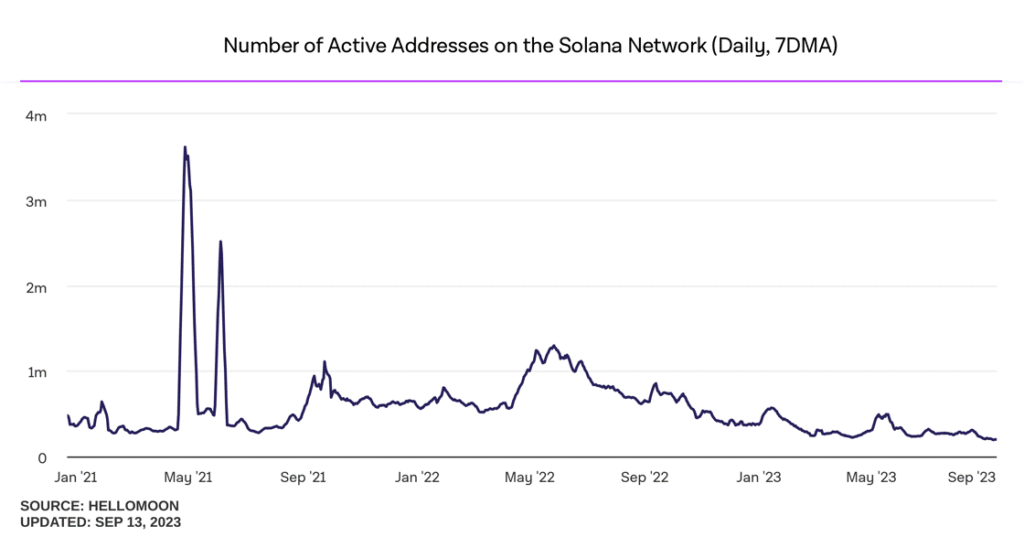
Source: The Block Data
That said, the performance of the SOL token has not mirrored the network’s improved fundamentals. One factor casting doubt is that FTX holds a significant amount of SOL tokens, amounting to ~$1.16B, according to the latest court filings. This could constitute significant selling pressure on the market. In collaboration with Galaxy Digital, the FTX estate is proposing to cap the selling at 100M per week to avoid impacting the market. Thus, we believe Solana is a network to be monitored, as its increasing role in payments may contribute to its resurgence.
Figure 4: FTX Holdings
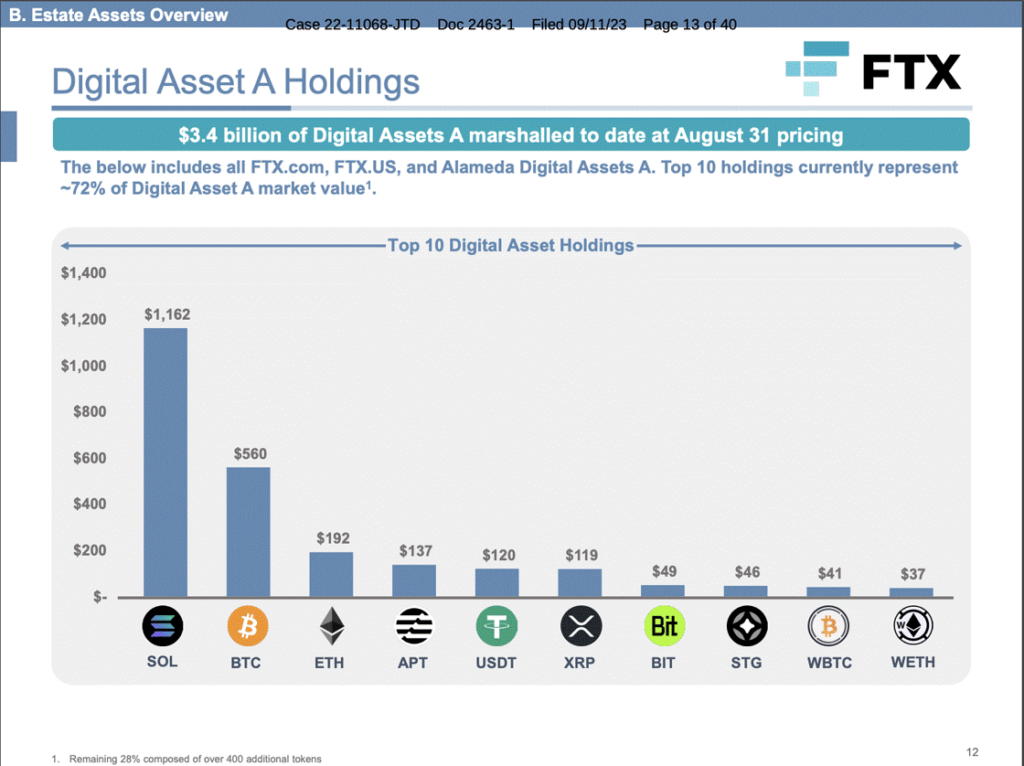
Source: Court Filing Submitted 9/11/2023
• Are Privacy Pools the Answer?
Vitalik Buterin, Ethereum’s founder, joined forces with Ameen Soleimani and Jacob Illum to collaborate with a team of security researchers from Chainalysis and various universities. Together, they unveiled a privacy-preserving protocol known as “Privacy Pools, pooling transactions to obscure the identities of both senders and receivers. What sets Privacy Pools apart is that users can utilize cryptographic proofs based on Zero-Knowledge (ZK) technology to demonstrate that their funds are connected to a trustworthy group of deposits as a way of filtering out criminal activity.
This capability enables users to validate the legitimacy of their funds, thus generating an additional layer of trust that can be aligned with regulatory standards such as Anti-Money Laundering (AML) practices. Privacy Pools hold significant potential in addressing the inherent problem of excessive transparency in public blockchains. This innovative solution offers a promising approach, building upon the foundational principles of projects like Tornado Cash, to fulfill the growing demand for financial privacy within public ledgers. At the same time, it ensures ongoing compliance efforts to combat illicit funding and uphold regulatory standards – a crucial progression necessary for institutions to confidently start experimenting with Blockchain Technology in a compliant manner.
Bookmarks
• Our latest Monthly Review was featured in ETFmarknaden.
• Research Analyst Carlos Gonzales wrote an op-ed for Henley & Partners on crypto valuation as part of their Crypto Wealth Report series.
• We updated our stablecoin dashboard.
• We’ve also updated our Friend.tech dashboard, tracking its adoption and revenue metrics.
• Find out more about price movements in August in our latest Crypto of the Month. Read here.
Next Week’s Calendar
These are the top events we’re monitoring for next week.
• Inflation data in the U.S. (CPI) is due on September 13.
• FTX court hearing on permission to begin selling assets is scheduled for September 13. Impact won’t be immediate if approved, court filings show.
• Polygon’s Dragon Fruit Upgrade, set to launch on September 16, would primarily update the scalability solution with the latest version of Ethereum’s programming language, Solidity.
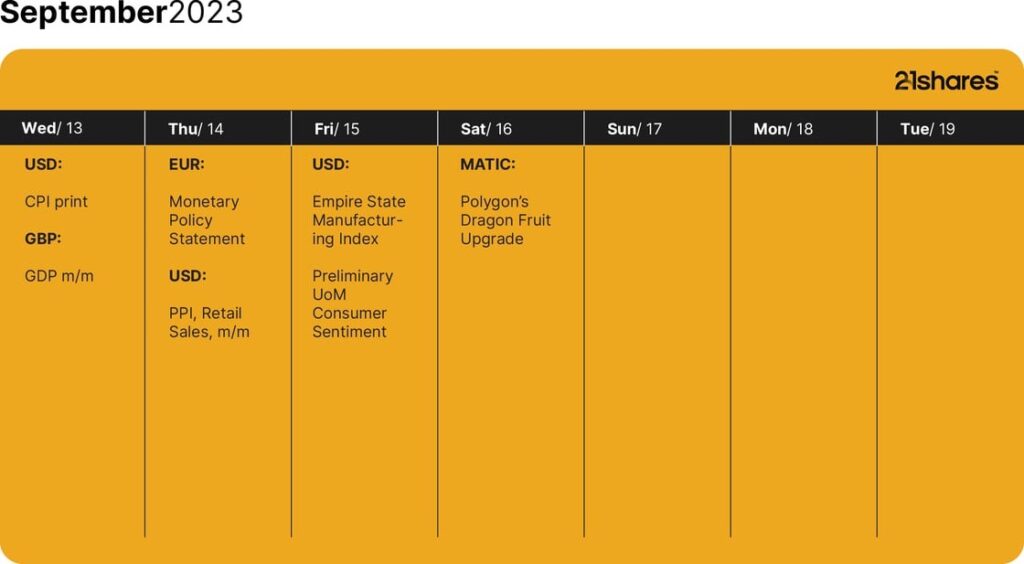
Source: Forex Factory
Research Newsletter
Each week the 21Shares Research team will publish our data-driven insights into the crypto asset world through this newsletter. Please direct any comments, questions, and words of feedback to research@21shares.com
Disclaimer
The information provided does not constitute a prospectus or other offering material and does not contain or constitute an offer to sell or a solicitation of any offer to buy securities in any jurisdiction. Some of the information published herein may contain forward-looking statements. Readers are cautioned that any such forward-looking statements are not guarantees of future performance and involve risks and uncertainties and that actual results may differ materially from those in the forward-looking statements as a result of various factors. The information contained herein may not be considered as economic, legal, tax or other advice and users are cautioned to base investment decisions or other decisions solely on the content hereof.
